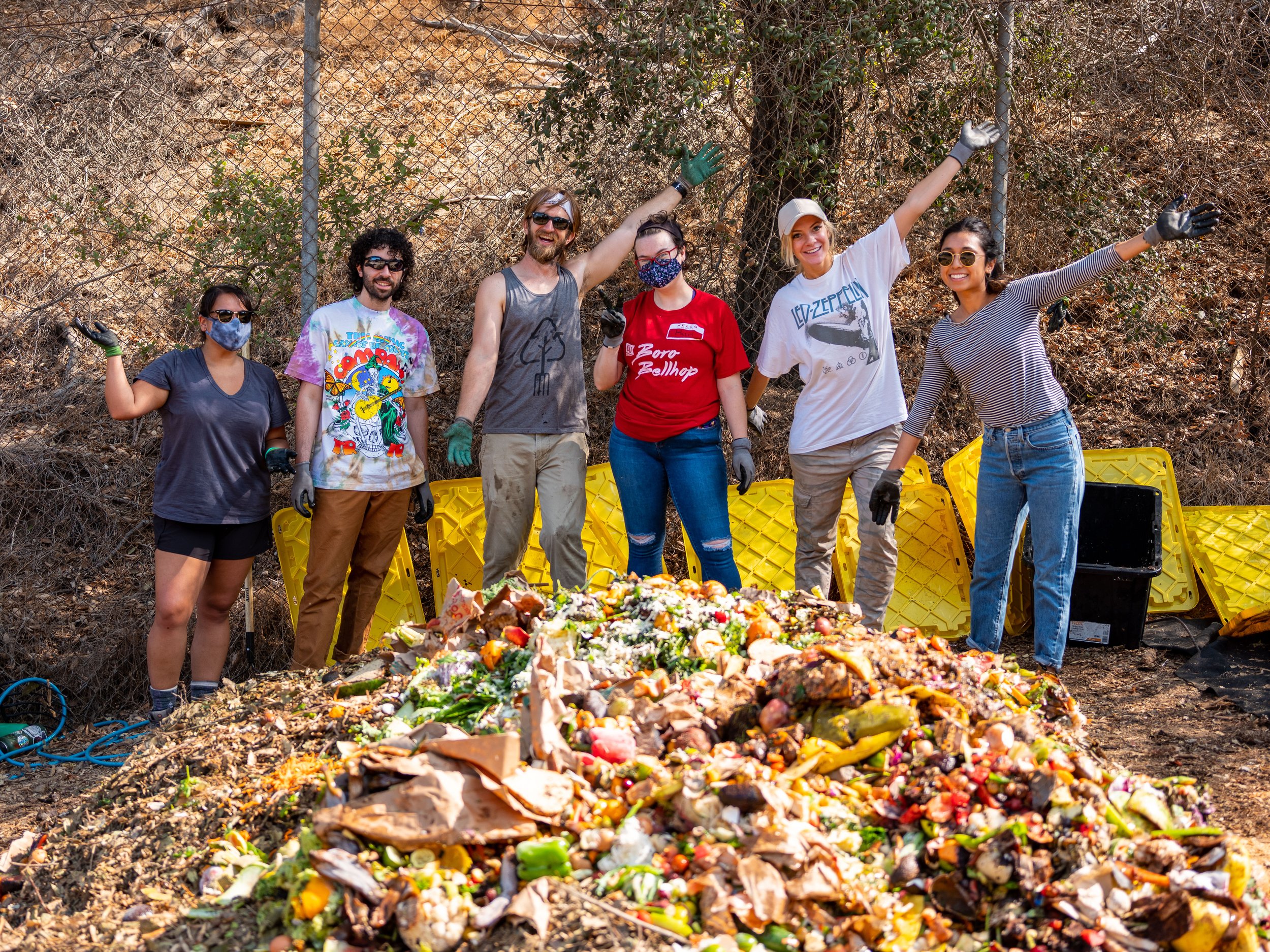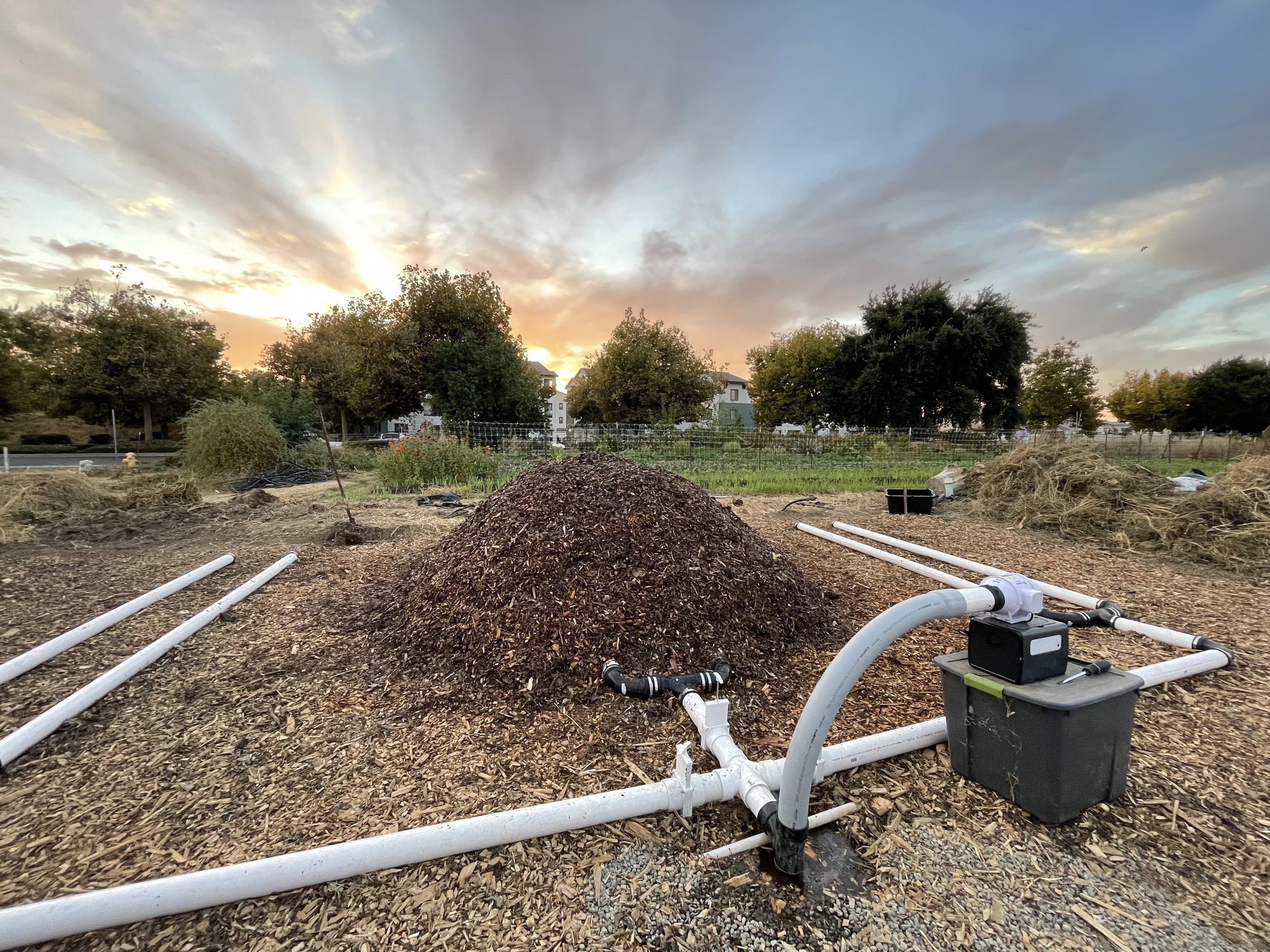California Department of Resources Recycling and Recovery’s (CalRecycle) Community Composting for Green Spaces Grant Program is funding community composting at hundreds of sites across California. In the first cycle of funding, the grant program awarded $1.5 million to the People, Food, and Land Foundation, which supported community composting at 117 sites throughout California, planted 488 trees, created 4,418 cubic yards of compost, and reduced emissions by 2,508 MTCO2e of GHG emissions. An additional $4.2 million was awarded to the California Alliance for Community Composting and LA Compost in the second cycle of the program. Through the establishment or expansion of community composting sites, communities receive benefits such as part time jobs and training on composting practices, fresh produce from adjacent gardens, training on farming practices, an increase in shade from tree planting, and the development of green spaces.
In cities, sites participating in the Community Composting for Green Spaces Grant Program support small communities or neighborhoods. At larger rural sites, the program serves a diverse range of businesses and residences over broader areas. Sites can be found as far north as Klamath, and as far south as San Diego. Through this program, the grantee works on project design with the community group that will be hosting the site to support the unique needs of the community each site serves.
Site operators at a Cycle 1 site stand near a recently completed pile of compost.
One community composting site is on the Tribal lands of the Yurok Tribe, who established community composting to divert waste created from garden spaces, fruit and vegetable scraps from school kitchens and nearby households, and yard and green waste from across the Yurok Reservation. With the presence of black bears and other scavenger wildlife species in the area, Tribal members encountered unique challenges to safely maintaining their composting site, so the grant funded the purchase and installation of electric fencing to keep potentially dangerous wildlife from snacking and napping on the warm compost pile.
Another site at New Roots Farm in West Sacramento, run by the International Rescue Committee (IRC), is teaching farming practices to refugees and the wider community, using the compost generated to provide soil fertility for their crops. Many of those composting and farming at this site are refugees themselves who received help from the IRC when resettling in the area, and more than ten languages are spoken onsite. “We call our farm a global local farm, growing the healthy food without using fossil fuels and working with the soil biology, working with the biomass that we produce,” the site’s director Ram Khatiwoda explained. “We are growing soil, we are growing healthy food, and my farmers are using a lot of this compost, and it is keeping our soil biology healthy. We are really making this land a thriving land, where we grow food.” In the second cycle of the program, New Roots Farm has been equipped with a solar‑powered aerated static pile system, which will greatly increase the amount of compost that this site is able to produce.
Build participants pose with the Aerated static pile system, including Ram Khatiwoda (bottom left).
In the San Joaquin Valley, Fresno Metro Ministry operates Yo’Ville Community Garden and Farm which produced an impressive 562 cubic yards of compost in the first cycle of the Program. Fresno Metro Ministry has partnered with the Fresno Housing Authority to engage Fresno Housing residents and transform an empty 7‑acre lot into a community garden that reflects the community, serves residents, and improves access to fresh produce and green space. The area is designated as both a disadvantaged community and a low‑income community. In the second cycle of funding, Cypress Compost Company will establish a secondary composting site on 0.25 acres of Fresno Housing Authority land behind Yo’Ville Community Garden and Farm, which is expected to divert 5,000‑8,000 pounds of food scraps and green waste materials per week once operational.
The third cycle of the program, currently being solicited, is open only to qualifying Tribal entities within the state, with the aim of increasing the number of Tribal communities operating small‑scale composting programs that support green spaces. This effort will also increase local composting capacity while expanding community knowledge about the benefits of compost use and proper composting techniques. CalRecycle’s goal is to assist Tribal communities in overcoming barriers to starting and managing community‑based composting programs by providing targeted resources. These resources will increase the ability of Tribal community groups to divert materials from landfills, increase their knowledge and experience with composting, and help foster climate resilience.
The completed aerated static pile system, built by grantee staff, volunteers from the New Roots Farm site, and CalRecycle staff who attended the grantee’s training event in October 2023.




